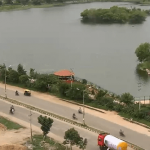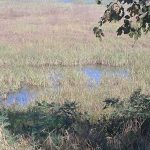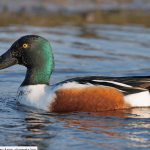By Anuksha Dey
On April 5, Jothi Viknesh, a Zumba instructor who happened to be on a walk at Kaikondrahalli Lake, Sarjapur Road, uploaded a video on Youtube that took Bangaloreans by shock. The video showed Jothi trying to save a spot-billed duck that was struggling to breathe near the water body. The visuals showed more than five dead ducks in the murky waters of the lake, and the massive amount of sewage that was flowing into it. Interestingly, all the bodies seemed to be of spot-billed ducks, while the other water birds appeared to be unaffected.
Raising awareness about sewage inflow at Kaikondrahalli Lake
Jothi and Sachin Pandhare saw a spot-billed duck lying in the murky waters of the lake on Sunday, April 4. The two nature lovers attempted to rescue the bird by washing away the dirty water and taking it to a vet. The duck was seen to be choking, and was unable to hold its head up on its own without the help of Jothi. However, the duck did not survive despite their best efforts. While the duo was unable to save it, they realised they could save thousands more by speaking up about the issue by creating a YouTube video to spread awareness. “The video gained over 3000 views in just one day,” Jothi told Residents Watch. The video shows sewage entering the lake through the inlets of the stormwater drain. The ducks are shown to be stuck in the sludge and unable to fly. Jothi and Sachin also comment on the stink in the lake.
How India’s ‘model lake’ turned toxic
In 2011, Kaikondrahalli lake was recognised as one of the two model lakes for the rejuvenation of water bodies in India. However, the pollution levels are rising in recent times. On 31st March, Mapsas, a citizen group that looks after the maintenance of lakes, posted that a green scum had been formed on the lake due to “the continuous inflow of raw untreated sewage from multiple points originating outside the lake.” The diversion pipelines are woefully incapable of managing the ever-increasing volume of sewage flowing in from the upstream settlements. Mohankrishna BT, BBMP Chief Engineer, lakes division, told Residents Watch: “There is an issue of sewage entry into the lake due to a blockage in the diversion pipe, we are cleaning it up and taking action to resolve the problem.”
A trustee from Mapsas told Residents Watch that ideally, there should not be any sewage flowing into the lake. “In 2016, we saw a small trickle of sewage entering the lake,” she says. “In 2019, the inflow increased to a problematic level. Despite a bio-enzyme treatment, the plan did not target the root cause of the issue, and the diversion channel built at Kaikondrahalli has a very low capacity.” According to her, the only sustainable way to reduce this problem is creating a bigger diversion channel, an underground drain, and a sewage treatment plant that would treat the water from the stormwater drain before it enters the lake.
Other potential causes for the deaths
Sachin Pandhare, an avid bird watcher,\ associated with Bng Birds, said that the only birds affected by this problem were spot-billed ducks, while cormorants and other species of birds continued to thrive. Jayanthi Kallam, the executive director of Avian and Reptile Rehabilitation Centre (ARRC) stated that the data available was too little to draw any conclusions about the cause of deaths. However, certain educated guesses could be made. “Sudden death of birds in lakes is more common than we think,” said Jayanthi. “Whenever concerned members of the public have reached out to us for unusual water bird deaths, we send samples for tests to determine their cause. So far, our tests for avian influenza in Bangalore have always come out negative.”
Jayanthi further explained that a particular avian species may be affected by species-specific viral as well as bacterial diseases or internal parasites. The other common causes for mass waterbird mortalities include avian botulism (a neuro-muscular illness caused by a toxin that is produced by a bacterial strain, C. botulinum) and karmful algal blooms induced by eutrophication. “The only way to identify the problem is continuous monitoring and documentation,” she says. “We need to make sure if this is a recurring event or a one-off incident.”
Algae Bloom in California (David MClain/Alamy)
Green scum at Kaikondrahalli lake bridge (Mapsas)
However, she does not completely dismiss the claim that the ducks are affected by the pollutants in the water. “Water mixed with sewage and other materials can cause harmful algae bloom (H.A.B.) as the sewage changes the nutrient composition of the water,” she says. “Reducing the water levels due to the summer heat can worsen the problem by increasing the concentration of the toxins. Water testing must be conducted to verify if this is indeed the problem at Kaikondrahalli Lake.” Jayanthi also explains that waterbirds expend more energy to forage due to food shortages caused by reduced water levels in summer, making them weaker and more susceptible to illnesses. “There could be multiple aspects to this problem and methodical data collection and sample testing need to be carried out to find the root cause for mass mortality of waterbirds.”
How can you help?
Jothi Viknesh is on a mission to save as many wild ducks as possible. “I have decided to go to Kaikondrahalli every Sunday to rescue these ducks and send them to ARRC,” he says. “I have put out a call for volunteers to help me do the same on social media.” If the mysterious death of Bengaluru’s water birds worries you, you could help by getting in touch with Jothi on Instagram.
Jothi and Sachin also mentioned that they had not been contacted by any organisations that work to save the environment or Bengaluru’s biodiversity. You could also help by forwarding the video and this article to any experts who might be able to provide Jothi with expert assistance. He can also be reached at: jothiviknesh@gmail.com.




